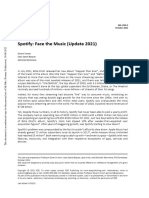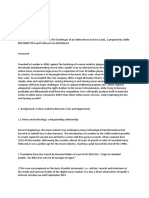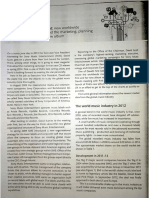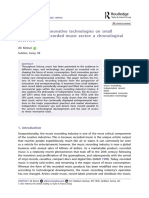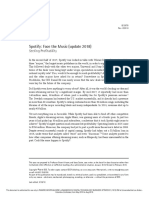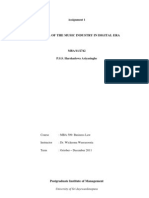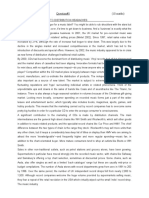4 TMZ is a music company based in the developed country of Artazia.
It was founded in 1963 when it started to sign
emerging rock and roll artists to its record label. TMZ offers a contract in which the artists receive royalties based on
the sales of their music. As part of this contract, TMZ record the music, distribute it and promote it. Most of the
contracts are for a defined number of songs or records. For example, in 1980, TMZ contracted the heavy metal band,
Vortex31, to produce ten albums, to be delivered over seven years. Extracted financial data for the period 1965–2000
is given in Table one. During these years TMZ successfully signed bands offering different and emerging types of music
(pop, punk, garage, grunge, patio) and also successfully altered the physical media of distribution, from vinyl records
to tape cassette and subsequently to compact disc (CD).
All figures in $million 1965 1970 1980 1990 2000
Revenue 10 70 120 150 170
Gross profit 4 30 45 50 50
Net profit 3 22 30 30 25
Table one: Revenue and profit information: TMZ (1965–2000)
The company remained profitable in this period, despite musicians taking longer to produce albums and senior
management adopting a relaxed and indulgent approach to their creative artists.
In 1999, the first file sharing company was formed in Artazia, allowing people to easily share their music files with
each other. During the next decade, numerous file sharing and digital downloading companies were launched. As
early as 2003, the possible implications of this growth in file sharing and digital downloading were highlighted by a
number of employees in TMZ. However, senior management at TMZ were dismissive of this threat, suggesting that
the contracts with their artists were ‘watertight’. Table two shows revenue and profit information for 2003–2007.
All figures in $million 2003 2004 2005 2006 2007
Revenue 165 150 130 100 80
Gross profit 45 30 10 0 (10)
Net profit 20 5 (15) (20) (30)
Table two: revenue and profit information: TMZ (2003–2007)
Senior management at TMZ believed that this decline in performance was due to them providing the ‘wrong music,
promoted to the wrong people at the wrong price’. During this period the company signed new artists, increased
advertising and cut prices. However, this did not halt its decline.
Losses were also made in 2008 and 2009 and the company was only kept afloat by fresh injections of shareholder
capital. During these years, the company took legal action against what they considered illegal downloading and file
sharing. It won a number of small cases but its actions angered many music fans, who felt that music labels had
been greedy in the past. It also upset some of its artists who now benefited from the opportunity the internet gave
them to sell music directly to their fans.
In 2009, a new CEO was appointed from outside the music industry. In 2010 he announced a new strategy. TMZ
was no longer interested in contracting new artists to the label. Instead it would focus on deriving profit from its
established artists and music catalogue. He came to licensing agreements with some large digital downloading
operators and stores, allowing them to access or sell the music of established artists. However, he continued litigation
against others. He also began to generate revenue from licensing the music for use in computer games, television
advertisements and personalised ringtones.
In 2011 the company reported a gross profit for the first time since 2005. In 2013 and 2014 it recorded a small net
profit. The CEO stated that TMZ was now a ‘slimmer, fitter company. We are a learning organisation, developing the
resilience needed to trade successfully in the ever-changing digital music age’. However, he warned that TMZ, like
others in the industry, would continue to pursue actions against the illegal downloading of music. ‘There is a
generation where many people consider music and all creative content should be free. However, we see signs that
this assumption is becoming less widely held. The next generation is questioning it. Like many others, we continue
to seek ways of distributing music which is fair to both the consumer and the artist. We are constantly monitoring
trends and patterns in consumer behaviour. We will not get caught out like we were ten years ago. We won’t be fooled
again!’
10
�Required:
(a) Analyse the performance of TMZ from 1965 to the present. Include in your analysis reference to the
principles and any evidence of strategic drift. (15 marks)
(b) The current CEO claims that TMZ is a learning organisation. Discuss the principles of a learning organisation
and its implications for TMZ. (5 marks)
(c) Knowledge management is closely related to the concept of the learning organisation. Explain knowledge
management and its relevance to TMZ. (5 marks)
(25 marks)













